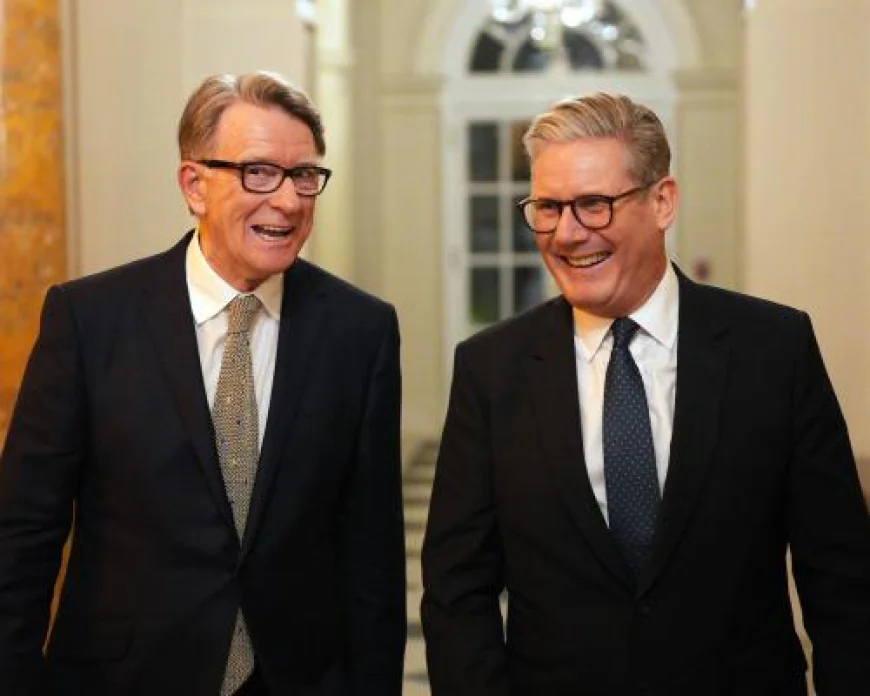Peter Mandelson Sacked as UK Envoy to Washington Amid Epstein Scandal
UK Ambassador to the US Peter Mandelson has been sacked over undisclosed ties with Jeffrey Epstein. PM Keir Starmer initially defended him in Parliament but reversed course after fresh evidence emerged. The dismissal raises questions over government vetting, Starmer’s judgment, and the timing ahead of a state visit by President Trump.

UK Ambassador to US Fired Over Epstein Links After PM’s U-Turn
The UK’s ambassador to the United States, Lord Peter Mandelson, has been dismissed following revelations of his close ties with disgraced financier Jeffrey Epstein, in a move that has ignited fierce debate about Prime Minister Keir Starmer’s judgment and the government’s vetting process.
The decision came just days after Starmer defended Mandelson in Parliament, saying the veteran Labour figure had expressed “genuine regret” for past associations with Epstein. But mounting evidence, including emails in which Mandelson referred to Epstein as “my best pal” and encouraged him to challenge his 2008 conviction, forced a dramatic reversal.
Revelations and Fallout
The scandal deepened after newly released documents showed Mandelson not only socialised with Epstein but also offered support during his legal troubles. In one 2008 exchange, Mandelson urged Epstein to “fight for early release,” while another message suggested his conviction was “wrongful.”
A 2003 “birthday book” also listed Mandelson describing Epstein as a close personal friend. Officials admitted this level of contact was “materially different” from what had been known when Mandelson was appointed to Washington in February.
On Thursday, Foreign Secretary Yvette Cooper confirmed Mandelson’s dismissal, stating:
“The credibility of our diplomatic representation must be beyond reproach. The newly uncovered material left no alternative.”
Starmer’s Initial Support
Only a week earlier, Starmer had stood at the despatch box defending Mandelson’s appointment, telling MPs that while Epstein’s crimes were “abhorrent,” Mandelson had shown remorse and was focused on strengthening ties with Washington.
That stance crumbled as pressure mounted from opposition MPs, parts of the Labour backbenches, and media scrutiny. With U.S. President Donald Trump’s state visit imminent, the government moved swiftly to contain the fallout.
Mandelson’s Response
In a farewell note to embassy staff, Mandelson described serving as Ambassador as “the privilege of my life,” while expressing regret over his past association with Epstein. He said:
“Two decades ago I misjudged a friendship. For that, I am profoundly sorry. But I respect the Prime Minister’s decision and wish my successor well.”
Political and Diplomatic Implications
The dismissal has raised urgent questions about how Mandelson was cleared during the vetting process and whether the government overlooked warning signs. Critics argue the Prime Minister’s credibility has been damaged by his earlier defence.
Sir Iain Duncan Smith, the Conservative leader, called it a “serious failure of judgment,” while some Labour MPs privately voiced concern that Starmer’s hesitation could weaken trust in his leadership.
Diplomatically, the timing is awkward. With President Trump due in London later this month, Britain must now scramble to nominate a new envoy to Washington at a moment of high-stakes trade and security discussions.
What Comes Next
The Foreign Office is expected to launch an internal review into the ambassadorial vetting process. Opposition parties are demanding a full parliamentary inquiry into what senior officials and Downing Street knew about Mandelson’s ties to Epstein before his appointment.
For Starmer, the controversy represents the most significant political test of his premiership to date, a moment that may define his reputation for judgment and accountability.
DWNews/The Guardian/FinancialTimes/Reuters


